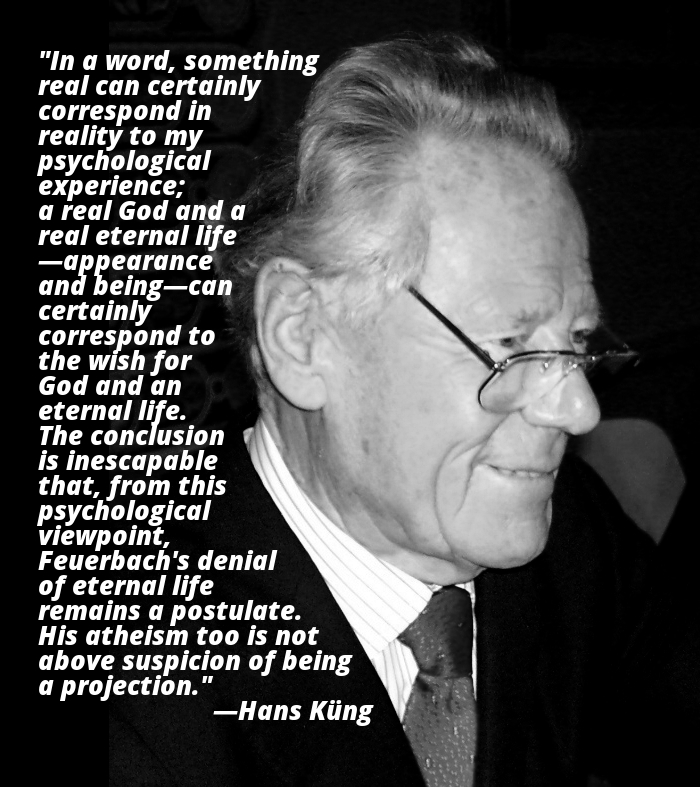Is God's existence only a projection of man's wishes that corresponds to no object in reality? Ludwig Feuerbach thinks so, and it is the basis of his atheism. Feuerbach is famous for his belief that theology is reducible to anthropology, such that man's religious beliefs are projections of his wishes so that man has made God in man's own image. Hans Küng believes that this argument for atheism by Feuerbach is a logical fallacy.
In his book Eternal Life?: Life after Death as a Medical, Philosophical, and Theological Problem, Küng says that an object's existence in reality is independent of man's wishes for that object's existence. This means that it is wrong to reject God's existence solely because man's wishes for God to exist. The opposite is also true that an object's existence in reality may not be rejected because man wishes for its existence. This argument turns against an atheist, because an atheist's rejection of God becomes another form of wish fulfillment because an object's existence is not determined by a man's disbelief in that object, or for believing the opposite of the common belief of mankind.
Küng admits that there may not be an object in reality that corresponds to man's religious wishes, but man's wishes alone may not be the basis for proving that's object's existence, nor may his wishes be used to dismiss that object's existence. However, if an object does exist in reality, there's a real possibility that object's existence has somehow influenced man's believe in said object.
Does this mean however that a psychological explanation of this kind is all that is to be said about the very complex problem of the "hereafter" or "eternal life"? Does recognition of the fact that psychological (or other) factors play a significant part in belief in an eternal life ipso facto exclude the possibility that these factors may be oriented to a real object, to a reality independent of our consciousness? Certainly the fact cannot be positively excluded (and this must be said for Feuerbach against all too hastily "transcendentally" deducing theologians) that perhaps in reality there is no object corresponding to man's different needs, wishes, instincts, including his striving for happiness (in Scholastic theology known as the desiderium naturale beatitudinis), and that in death I am absorbed into the eternal repose of nothingness. Who knows anything definite in this respect? But neither can the possibility be a priori excluded (and this must be pointed out against a self-confident atheism) that in fact there is something real (however it is defined) corresponding to all these needs, wishes, instincts and also to the striving for happiness, and that I shall be elevated into an absolutely final reality. Who could a prior maintain the opposite?
To be more precise, could not the sense of dependence and the instinct of self-preservation have a very real ground, could could not our striving for happiness have a very real goal? And if—in my belief in eternal life, as in all knowing—I put, project into the object is purely the product of my imagination? A projection and no more than that? Could not perhaps some kind of transcendent object, some kind of hidden reality of God—however this may be defined—correspond to all the wishing, thinking and imagining involved in our belief?
"If the gods are products of wishful thinking, it does not follow that they are merely such: we cannot conclude from this either to their existence or to their nonexistence," explains the philosopher Eduard von Hartmann: "It is quite true that nothing exists merely because we wish it, but it is not true that something cannot exist if we wish it. Feuerbach's whole critique of religion and the whole proof of his atheism, however, rest on the single argument; that is, on a logical fallacy." This is more than an argument in formal logic. For I can also deduce psychologically my experience in the world, but this implies nothing against the existence of a world independent of me, as the reference point of my experiences; it provides no reasons for solipsism. And I can deduce psychologically my experience of God, but this implies nothing against the existence of a divine reality independent of me, as the reference point of all my needs and wishes; it is not a proof of atheism. In a word, something real can certainly correspond in reality to my psychological experience; a real God and a real eternal life—appearance and being—can certainly correspond to the wish for God and an eternal life. The conclusion is inescapable that, from this psychological viewpoint, Feuerbach's denial of eternal life remains a postulate. His atheism too is not above suspicion of being a projection.
Küng, Hans. Eternal Life?: Life after Death as a Medical, Philosophical, and Theological Problem. Trans. Edward Quinn. Garden City: Image, 1985. 30-31. Print.




December 21st, 2015 - 21:08
I wish more people understood this: “it is not true that something cannot exist if we wish it.” Christians and atheist need to hear that!
January 23rd, 2020 - 10:10
The only way to achieve happiness is to cherish what you have and forget what you don’t have